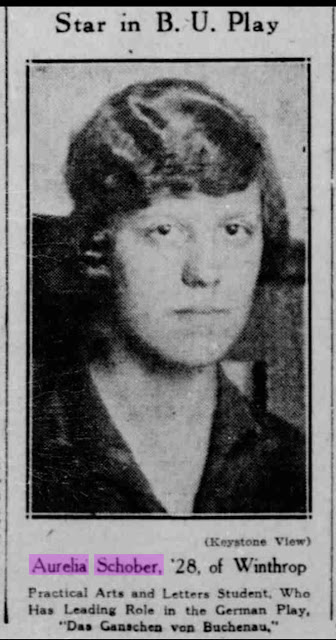Researching Aurelia Plath's life means seeking unconventional sources, and more than once I've hit the jackpot on eBay whence came the above press photo from a dealer unaware that it pictures Sylvia Plath's mother. Then college sophomore Aurelia Schober is kneeling in a scene from the German-language play
Das Ganschen von Buchenau ("The Little Goose of Buchenau").
College German Clubs liked to perform Ganschen, which in 1926 -- when Aurelia starred in her college's production -- was a two-act chestnut everybody loved. Harvard performed it in 1893. Radcliffe's program [pictured] from 1904 includes the following synopsis:
"Fink has been sent by his uncle to woo Agnes, but having been told by Silberling that she is coarse and stupid, "
ein Ganschen," he behaves in the rudest manner possible, hoping to have his suit rejected. Agnes's grandmother, disgusted by Fink's boorishness, urges her to accept Silberling, a dandy of the town. In spite of all this, Agnes falls in love with Fink. He soon learns how he has been deceived as to her, but not before her hand has been promised to Silberling, who wishes to marry her for her dowry. Agnes discovers how matters stand, and in order to make Silberling free her, pretends to be not only brainless and awkward, but poor as well. Her ruse succeeds. Silberling's true character is exposed; Agnes bestows her hand on Fink, with the full approval of her grandparents."
Aurelia played von Fink. You didn't need to know German to like what I hope was a broadly acted farce and big fun.
Aurelia was the leading "young man" in three annual Boston University College of Practical Arts and Letters German Club plays, Ganschen the first. In 1927 she was lovesick poet Strubel in Die Ferne Prinzessin ("The Faraway Princess"); then Prince Goldlande in Snow White and the Seven Dwarfs in 1928, years before the Disney movie.
Tall and big-boned ("statuesque") Aurelia also had a resonant voice comparable to Sylvia's BBC-recorded voice; at least two people who know have said so. Publicity photos exist for Ganschen and Die Ferne with Aurelia and her leading lady in much the same pose. Notice how if Aurelia had stood up she would have towered over her Ganschen co-star, Selma Orlov.
Their college's German Club was no slouch about publicity and distributed press releases and professional photos to newspapers -- which published them, including a headshot of Aurelia Schober as herself, headlined "Star in B.U. Play," and a headshot of Aurelia as mustachioed von Fink. The von Fink headshot, identified as "Miss Aurelia Schober," appeared in Florida and Oklahoma small-town newspapers, evidently for the entertainment value cross-dressing could provide. Aurelia never again looked so rakish in any photo I have seen.
Aurelia wanted to become a writer, but her artistic talent was for acting, or the stage. That was attested by her peers not only at her college but at Brookline High School, where Aurelia performed as a female with other teachers in the modern comedy The Show-Off in 1930. A very sedate cast photo ran in the Boston Globe. Aurelia wrote that an agent in the audience told her she had talent and mentioned Broadway. Like several anecdotes showing Aurelia as a person who had any talent or success, that anecdote was cut from her preface to her selection from daughter Sylvia's letters, Letters Home (1975).
One of my Shakespeare professors made a career of spinning Shakespeare's cross-dressing characters into transgressive gender-benders (a male actor playing a girl playing a guy!). There might be a Ph.D. in studying Sylvia Plath's mother -- a single mother -- whom Aurelia and Sylvia said had the burden of being, in real life, both a woman and a man.
[Notes: Das Ganschen von Buchenau by Wilhelm Friedrich Reise, c. 1830; "Harvard performed it," Crimson, 3 March 1893; "In 1927," "German Club to Present Play at B.U. Tomorrow," Boston Post, 3 February 1927; "Star in B.U. Play" with photo, Boston Transcript, 12 January 1926; "appeared in Florida," this blog 10 September 2020; "Boston Globe," 8 December 1930 p. 22.]




